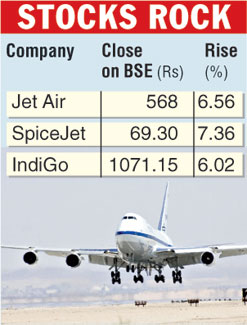
New Delhi, June 20: The government has allowed foreign direct investment of up to 100 per cent in India's troubled airline sector.
While foreign funds or other firms can now own up to 100 per cent in local carriers, foreign airlines will continue to hold up to a 49 per cent stake.
The policy change can create a situation of investors from a foreign country holding a majority stake in a local carrier: the airline of a city state picks up a 49 per cent equity in an Indian airline and the sovereign wealth fund of the same state acquires more stake. Though a large number of countries allow foreign ownership of its airlines, many others, including the EU and the US, do not.
Said Amber Dubey, partner and head, aerospace and defence, KPMG in India: "Though equity holding of foreign airlines is still limited to 49 per cent, a foreign airline can join hands with its sovereign fund or private investors and set up a 100 per cent foreign owned airline in India. (In these circumstances) It will be free to use the bilateral quota from the Indian side."
Bilaterals are rights given by one country to another to operate air services to it.
Most Indian airlines are just turning the corner after years of weak balance sheets, which means they sorely need funds for fleet expansion.
Analysts said airlines such as Jet or Air Asia could benefit from the policy, with foreign airline partners ramping up their stakes. SpiceJet, which has traditionally wooed sleeping partners to invest in it, could benefit by attracting more foreign private equity investors.
Shares of aviation companies such as SpiceJet and Jet Airways surged up to 7 per cent today. Air Asia founder Tony Fernandez said, "The government is moderating and showing the way."
The Centre had last week allowed Indian airlines with less than five years of experience to fly international routes if they operate at least 20 aircraft in the domestic market.
"After the path breaking policy, this comes like an unexpected icing on the cake," said Dubey.
However, other analysts warned that the move may not lead to a foreign investment rush in the sector.
Said Peeyush Naidu, partner, Deloitte: "We are unlikely to see investors rushing to invest in airlines just because the cap of 49 per cent has been removed. Also investment by foreign airlines is still capped at 49 per cent - so it remains to be seen if investors such as PEs will have the risk appetite to make such investments."
The government also announced that for existing airports, foreign investors could buy up to a 100 per cent stake under the automatic route.










